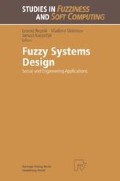Abstract
This study is about the fuzzy and unpredictable nature of social life. Two themes are developed. The first describes and critiques a methodological approach to social systems intervention for improvement. The second theme comprises a propositional questioning about the nature of social systems from a fuzzy logic framework. The crucial role of fuzzy logic is demonstrated in such fields of social inquiry as conversation mapping, heuristic pattern formation, emergence of meaning, multy-layered interpretation, study of temporality and non-foundational thinking.
Access this chapter
Tax calculation will be finalised at checkout
Purchases are for personal use only
Preview
Unable to display preview. Download preview PDF.
References
Woog, R. A., Kelleher F. M., Turner A. S. and Blaydon D. L. (1993) Improving Research Adoption By Wheat Producers, Research Report, University of Western Sydney-Hawkesbury.
Kuhn-White L. J., Gamble D. and Blunden S. (1993) An Examination of the Epistemological Foundations of an Action-Research Project: The Transfer of the Family Farm Business. Paper presented to „Constructivism: The Intersection of Disciplines“, Deakin University, Victoria, Research report, University of Western Sydney-Hawkesbury.
Woog R. A. and Bawden R. (1994) All You Ever Needed to Learn About Management in Your MBA But Probably Didn’t, Proceedings of the Australian Management Congress for Management Development Practitioners.
Khatoonabadi A. and Woog R. A. (1992) Drama as a Researching Tool With Nomadic People, Proceedings of the International Conference, Nomadism and Development: Survival Strategies and Development Policies. Isfahan, Iran.
Zadeh L. (1965) Fuzzy Sets, Information and Control, Vol 8, pp. 338–359.
Zadeh L. (1994) Neural Networks and Soft Computing, Communications of the ACM, Vol 37, No.3, pp. 77–84.
Dimitrov V. (1970) Heuristic Generator in Human-Operator Systems, Technical Cybernetics, Vol 2, 1970 (published in Russian by the Institute of Cybernetics of the Ukranian Academy of Sciences, Kiev).
Barney P., Dimitrov V. and Stanchev P. (1974) Fuzzy System Approach to Decision-Making Based on Public Opinion: Investigation Through Questionnaires, Proceedings of the Stochastic Control Symposium, Budapest, Hungary, pp. 637–642.
Dimitrov V. and Wechler W. (1975) Optimal Fuzzy Control of Humanistic Systems, Proceedings of the Sixth World Congress of IFAC, Boston.
Dimitrov V. (1976) Social Choice and Self Organisation Under Fuzzy Management, Kybernetes, Thales Publ.Ltd., vol. 6, pp.153–156.
Dimitrov V.(1983) Group Choice under Fuzzy Information, Fuzzy Sets and Systems, North Holl.Publ.Co., vol.9. pp. 25–39.
Culler J (1982) On Deconstruction: Theory and Criticism after Structuralism, Cornell University Press.
Woog R. A. (1994) Understanding the Dairy Industry: Knowledge, Beliefs and Values, Research Report, University of Western Sydney-Hawkesbury.
Woog R. A. and Dimitrov J. (1994) Social Ecology: A Post Modernist Neo-Positivist Methodology, Humanecologi, vol 13, pp. 7–11.
Bawden R. and Woog R. A. (1994) Changing Minds For Changing Ways: Hawkesbury’s Quest For Better Agriculture. Proceedings of Congress De L’Orde Des Agronomes Du Quebec.
Guthrie W. K. C. (1981) A History of Greek Philosophy Vol. VI, Cambridge University Press.
Kuhn-White L., Woog R. and Dimitrov V. (1996) An Exploration of Human Knowing: From Beyond the Foundational Position on Towars Humility Through Irritating Ideas, presented at The 1996 Scholarly Conference for Post-Graduate Students and Academics, Sydney, July 17–20.
Dimitrov V., Woog R. and Kuhn-White L. (1996) The Divergence Syndrome in Social Systems, Complex Systems 96, IOS Press Amsterdam, Netherlands, pp. 142–146.
Author information
Authors and Affiliations
Editor information
Editors and Affiliations
Rights and permissions
Copyright information
© 1998 Springer-Verlag Berlin Heidelberg
About this chapter
Cite this chapter
Woog, R., Dimitrov, V., Kuhn-White, L. (1998). Fuzzy Logic as an Evocative Framework for Studying Social Systems. In: Reznik, L., Dimitrov, V., Kacprzyk, J. (eds) Fuzzy Systems Design. Studies in Fuzziness and Soft Computing, vol 17. Physica, Heidelberg. https://doi.org/10.1007/978-3-7908-1885-7_7
Download citation
DOI: https://doi.org/10.1007/978-3-7908-1885-7_7
Publisher Name: Physica, Heidelberg
Print ISBN: 978-3-662-11811-5
Online ISBN: 978-3-7908-1885-7
eBook Packages: Springer Book Archive

